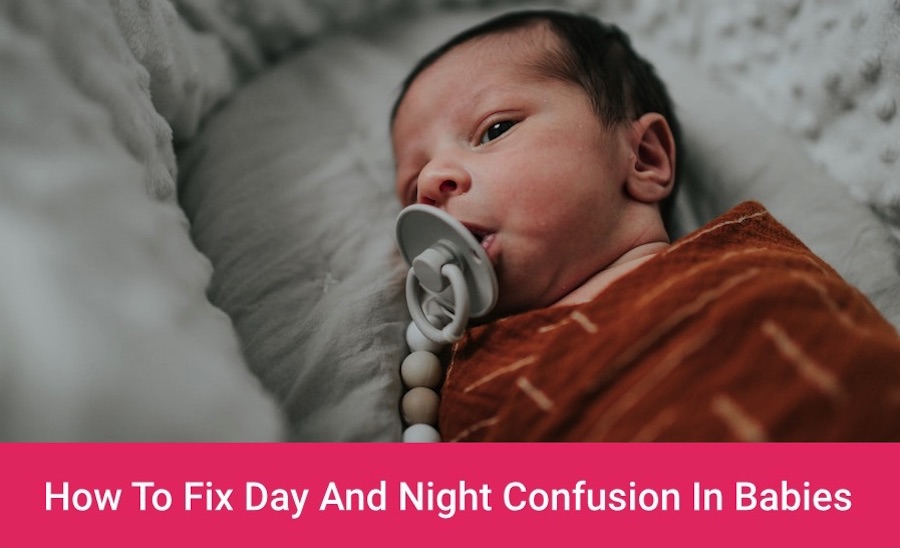
Article by Macy Tollefson – doula, breastfeeding specialist & prenatal yoga teacher
As a new mom, these early days of parenthood can feel exhausting, challenging and overwhelming – especially if your baby is struggling with sleeping! You may be worried that something is wrong, or wondering if there is anything you can do about it.
Newborn day-night confusion can be challenging to navigate, as it disrupts you own sleep patterns and makes it difficult to establish a regular routine.
The good news is that there ARE some strategies that can help babies adjust their sleep patterns over time! The better news is that they won’t have their days and nights mixed up forever.
Let’s dive into some helpful tricks to get you and your baby on the path to better sleep.
This article is not a substitute for medical advice or consultation.
What Is Newborn Day – Night Confusion?
Newborn day-night confusion, also known as day-night reversal, refers to a common phenomenon experienced by many newborn babies during the first few weeks of life. It occurs when a baby’s sleep patterns become disorganized, and they have difficulty distinguishing between day and night. This often leads to them being awake more at nighttime, rather than during the day.
Think about it this way – your baby has just spent the last nine or so months in a dark, quiet, cozy room… They have never experienced light in this way, and there’s no way for them to understand that they have their days and nights mixed up! They don’t have a schedule the same way we do… yet1!
In the first few months, your baby is going to be growing and changing A LOT. They need to wake up every few hours to feed, and it’s truly unrealistic to expect them to sleep through the nights right away. It’s going to take time for them to fix day night confusion, but I promise – it will happen!

What Causes Day And Night Confusion In Babies?
Newborns have underdeveloped circadian rhythms, which are internal biological clocks that regulate sleep-wake cycles.
While in the womb, they are not exposed to the light-dark cycles of the outside world, so their sleep patterns are not synchronized with day and night. After birth, it takes time for their circadian rhythms to adjust.
During the day, newborns may sleep for shorter periods and have frequent waking periods. They may be more alert, active, and have periods of feeding and interaction with you and your family.
At night, however, they may have difficulty settling down to sleep, become more awake and fussy, and have trouble staying asleep for extended periods.
Other sleep issues that your little one may be struggling with in the first few months are: sleep regression at 6 weeks, overtired baby cycle and napping only for 30 minutes. These are all very common and normal problems – you’re not alone!
Is It Normal That My Newborn Baby Is Up All Night?
It is perfectly normal for newborn babies to have day night confusion – after all, they’ve never truly experienced daytime like this before! They need to be taught what are healthy sleep habits and need some time to regulate their internal clock.
During the first few weeks, it’s important to be patient and understanding as your baby’s circadian rhythms develop.
By following consistent sleep routines, exposing the baby to natural light during the day, and creating a calm environment at night, you can help them gradually adjust to the day-night cycle.
As they begin to sleep for longer periods of time, eventually they will begin to match their routine to the family’s2.

8 Solutions For Fixing Day And Night Confusion In Babies
The good news is, there are many different ways to help your newborn sleep better!
Keep in mind that these tips serve as general guidelines, and it’s important to adapt them to your baby’s unique needs and consult with a healthcare professional for personalized advice if needed.
1. Stimulate Them During The Day
When you wake up your baby in the morning, open the curtains and let the sunshine in! Have them by the window or take your baby outside for some natural, bright light exposure. This helps reinforce their internal clock and sets the tone for an active day.
During their wake window, keep interactions stimulating, talk to them, and encourage active play. These wake windows may be short in the early days, but stimulating them during this time will help reinforce the idea that daytime is for alertness, engagement and awake time!
For context, Taking Cara Babies3 lists the average wake window lengths are:
- 0-4 Weeks: 35-60 minutes
- 4-12 Weeks: 60-90 minutes
- 3-4 Months: 75-120 minutes
2. Focus On Full Feedings
Daytime feeds should be as full as possible. If you are breastfeeding, you want to ensure that your baby is effectively draining your breast during each session, instead of cluster feedings, or lightly snacking constantly throughout the day.
Having full feedings will allow them to stay asleep for longer4, and overtime will allow night feedings to become less and less frequent.
3. Encourage Naps
With that being said, there is a balance. Newborn babies sleep much of the day, and it’s still very important that they have lots of time to rest! Follow their sleepy cues and encourage regular daytime naps to prevent being them from being overtired.
Ensure your baby has a comfortable, peaceful nap environment with minimal distractions. A well-rested baby is more likely to establish healthier sleep patterns. Do NOT force your baby to stay awake, hoping that they will then sleep through the night!

4. Optimize Their Nursery/Sleeping Area
The nursery or sleeping area should be optimized for deep rest. Avoid putting them down to sleep in a bright room, or anywhere that sunlight is coming through – especially for daytime napping!
Try using a sound machine, white noise machine, or soothing music to drown out any outside noise (this can make all the difference!). You want your baby sleeping in a calm, dark, quiet environment to promote healthy sleep patterns.
5. Keep Night Time Soothing
When your baby wakes up at night, keep interactions calm and soothing. Minimize stimulation, use gentle touch or rocking, and avoid bright lights or loud noises. This will help their circadian rhythm, as they learn that darkness and nighttime is for sleep.
During nighttime feeds, do your best to keep the room dark and not turn any overhead lights. It’s best to keep baby sleepy, to help them transition back to sleep quickly. Some parents like to do the diaper changes FIRST, then follow with the night feed to help their newborn sleep faster.
6. Experiment With Swaddling
Some babies love to be swaddled in their crib for sleeping, while others find it too restrictive. Every baby is different, so follow their cues! In some cases, a swaddle may be the thing to soothe them through those stretches of sleep.
If your little one is not a fan of swaddling, I recommend you to read this article with tips what to do if baby hates a swaddle.

7. Establish A Bedtime Routine
Develop a consistent sleep schedule and bedtime routine to signal to your baby that sleep time is approaching. Incorporating activities such as a warm bath, gentle massage, quiet reading, or sing soft lullabies, will help prepare baby to sleep.
A predictable routine helps your baby recognize sleep cues. Sleep training is another option to explore, if you feel that could be a good fit for your family!
8. Be Consistent
Patience is key! Remember, adjusting to a day-night cycle takes time for babies. Be patient, consistent, and understanding as they develop their internal clock. With time and persistence, they will gradually establish healthier sleep patterns.
How Long Does Day – Night Confusion Last In Babies?
Day-night confusion in most babies typically lasts for a few weeks5, usually resolving by the time they are around 6-8 weeks old. However, every baby is different, and the duration of day-night confusion can vary. Some babies may adjust their sleep patterns sooner, while others may take a bit longer.
As your baby grows and develops, their sleep patterns will become more organized, and they will begin to distinguish between day and night. Establishing a consistent sleep routine and promoting healthy sleep habits can further support this transition.
If day-night confusion persists beyond a few months or if you have concerns about your baby’s sleep patterns, it’s a good idea to consult with a pediatrician or a sleep specialist for personalized guidance and advice.

How Long Does It Take For Babies To Adjust To Night And Day?
Every newborn will have different sleep patterns and needs, and it takes time for them to adjust. In general, it will take anywhere from a few days, to a few weeks for baby’s day night confusion to work itself out.
With that being said, it can take 2-4 months for your baby’s circadian rhythm to FULLY develop6, so be patient and know it’s all a part of the process.
With consistency, and over time, the baby’s sleep patterns should gradually become more synchronized with day and night. If you have concerns about your baby’s sleep or need additional support, consult with a pediatrician or a sleep specialist.
Article By Macy Tollefson
Macy Tollefson is a full spectrum doula, breastfeeding specialist and prenatal yoga teacher. She is passionate about guiding the modern mama on her journey through the beautiful (and wild) transformation of pregnancy, birth and postpartum. Macy envisions a world where every mother has access to the resources she needs, and follows her intuition to make the best decisions about what is right for her and her baby.
The purpose of this article is informative. It’s not a substitute for professional medical advice or medical care. Remember: safety first! Consult your doctor/pediatrician in case of any doubts. The author of this article does not accept any responsibility for any liability, loss or risk, personal or otherwise, incurred as a consequence, directly or indirectly, from any information or advice contained here.
Resources:
https://www.happiestbaby.com/
https://www.newtonbaby.com/
https://takingcarababies.com/
https://thepostpartumparty.com/

